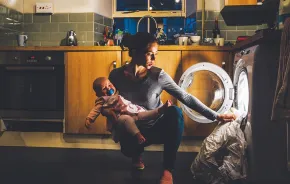 Editor's note: On Tuesday, May 1 at 7 p.m., ParentMap will host an evening for parents on preteens and puberty with Seattle Children's Hospital educators Julie Metzger RN and Rob Lehman MD. The talk is titled Will Puberty Last My Whole Life? and will last from 7 to 9 p.m. at Seattle Children's Theatre; tickets are available for $20.
Editor's note: On Tuesday, May 1 at 7 p.m., ParentMap will host an evening for parents on preteens and puberty with Seattle Children's Hospital educators Julie Metzger RN and Rob Lehman MD. The talk is titled Will Puberty Last My Whole Life? and will last from 7 to 9 p.m. at Seattle Children's Theatre; tickets are available for $20.
Read on to learn more about some of the strategies that Metzger and Lehman will be sharing during the lecture.
By Elaine Bowers and ParentMap staff
During the rollercoaster teen years, parents often feel helpless to protect their teens against the influence of friends and a popular culture that bombards them with sexual images and trivializes the act of sex.
“Parents think that the culture is a tsunami coming at them,” says Julie Metzger, R.N., M.N., whose puberty classes have been a rite of passages for Puget Sound girls and their moms for the last 20 years. “But if the kid and the parent are attached in a healthy way, a tsunami is nothing compared to that attachment.”
Metzger says studies consistently show that tweens and teens who feel connected to their parents, to their school and to a larger community, such as a faith community, delay risky behavior. Parents have to work on staying connected to their teens, even as their kids seem to be pushing them away.
“I think parents have to stay awake; they have to pursue their kids,” Metzger says. “Pushing away is their way of engaging with you. They’re hoping you’re not going to turn around and walk away. Your job is to invest in who they are — stand close and stay back simultaneously.”
When your children are small, they ask all the questions and parents have all the answers, Metzger says. “When the kids become teenagers, we’re doing all the asking: ‘Is your homework done?’ ‘Are you really going to wear that?’ ‘Blah, blah grades, blah, blah homework.’”
Metzger recommends focusing on important issues so that your teen doesn’t tune you out. Ask what your teen is passionate about; help them discover how they’re going to change the world. “I’d rather they talk about what kind of people they’re going to be and how they’re going to navigate this complex world with a sense of integrity,” she says.
Start early — or late!
Experts recommend starting early, preferably before they’re in kindergarten, to have age-appropriate conversations with your child. The subject of sex can’t be addressed in one big talk. “To reach kids, you need 200 one-minute conversations,” Metzger says.
As Amy Lang, M.A., a Seattle sexual health educator Lang points out, it’s never too late to start talking. Begin with acknowledging to your teen that the talk is long overdue. The conversation may be difficult, but parents need to get past their own uneasiness and start talking, Lang says.
“This is about your kid’s health and safety. This is about HIV, STDs, pregnancy. This is about your being a grandparent before you’re ready,” she says.
Since your teen is already being bombarded by the media, use it to start a conversation. When the news is about another teen star being pregnant and unmarried at 17, use the story to ask your teen, “How would you prevent that from happening to you?”
If your teen is in a serious relationship, speak up. Acknowledge that your teen is in a relationship that is growing closer. Then make two important points, Metzger suggests: “Say, ‘It’s important to me that you have the resources and the information you need to be safe, and what I hope for you is …’” Parents should fill in the blank with their values, Metzger says — that their teen wait until marriage, that they not be pressured in to a sexual relationship; whatever is important to them.
The good news
And there is good news: According to researchers at the University of Washington, students who receive comprehensive sex education are half as likely to become teen parents as those who get none or abstinence-only sex education. Teens who had comprehensive education, which typically discusses condoms and birth-control methods as well as abstinence, were no more likely to engage in intercourse than peers who were taught just to say “no” to sex before marriage, according to research.
Sex education programs in schools are important, and Washington state schools offer good ones, Metzger says. But parents should not forget that they are their kids’ best examples.
“The best sex talk you can give your kids is to love, nurture and take care of your own relationship,” she says. “Show your kids how to love and respect the people in your life.”
Elaine Bowers is a Seattle writer and mother. This post was adapted and updated from her 2009 ParentMap article, The 'S' Word: Talking to Tweens and Teens about Sex.









